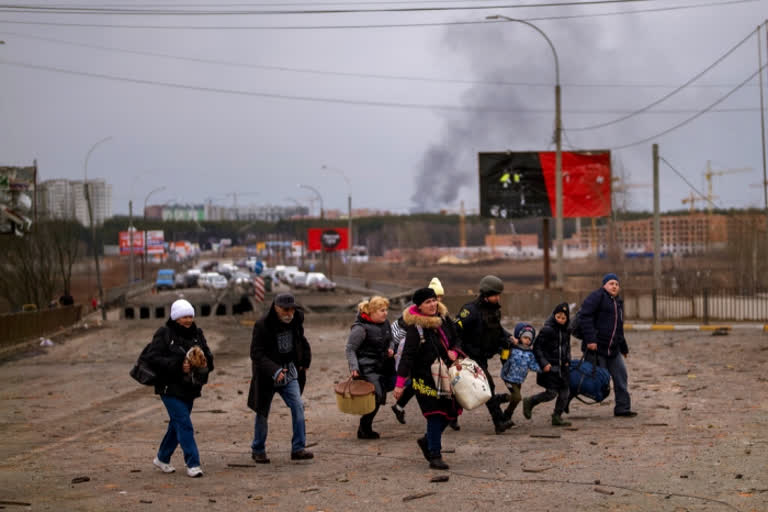Lviv: Buses packed with people fleeing the Russian invasion in Ukraine began a procession along a snowy road out of one city Tuesday, as a new effort to evacuate civilians along safe corridors finally got underway. The Russian onslaught has forced 2 million people to flee Ukraine, U.N. officials said Tuesday, but has trapped others inside besieged cities that are running low on food, water and medicine amid the biggest ground war in Europe since World War II.
Previous attempts to lead civilians to safety have crumbled with renewed attacks. The route people took Tuesday out of the eastern city of Sumy was one of five promised by the Russians to offer civilians a way to escape the fighting.
Video posted by the Ukrainian state communications agency showed people with bags boarding buses, but it was not clear how long the effort would last. "The Ukrainian city of Sumy was given a green corridor, the first stage of evacuation began," the agency tweeted. Sumy is just 50 kilometers (30 miles) from the Russian border.
With the invasion well into its second week, Russian troops have made significant advances in southern Ukraine but stalled in some other regions. Ukrainian soldiers and volunteers fortified the capital, Kyiv, with hundreds of checkpoints and barricades designed to thwart a takeover. A steady rain of shells and rockets fell on other population centers, including the Kyiv suburb of Bucha, where the mayor reported heavy artillery fire.
"We can't even gather up the bodies because the shelling from heavy weapons doesn't stop day or night," Mayor Anatol Fedoruk said. "Dogs are pulling apart the bodies on the city streets. It's a nightmare."
In one of the most desperate cities, the encircled southern port of Mariupol, an estimated 200,000 people — nearly half the population of 430,000 — were hoping to flee, and Red Cross officials waited to hear when a corridor would be established. Russia's coordination center for humanitarian efforts in Ukraine and Ukrainian Deputy Prime Minister Iryna Vereshchuk both said a cease-fire was agreed to start Tuesday morning to allow some civilians to evacuate, but the two sides differed on where they said the corridors would be.
Russia's coordination center suggested there would be more than one corridor, but that most would lead to Russia, either directly or through Belarus. At the U.N., however, the Russian ambassador suggested corridors from several cities could be opened and people could choose for themselves which direction they would take. Vereshchuk, meanwhile, only said that the two sides had agreed to an evacuation of civilians from the eastern city of Sumy, toward the Ukrainian city of Poltava. Those to be evacuated include foreign students from India and China, she said. She reiterated that proposals to evacuate civilians to Russia and its ally Belarus, which was a launch pad for the invasion, were unacceptable.
Also read:India expresses concern over safety of stranded Indian students in Ukraine
Demands for effective passageways have surged amid intensifying shelling by Russian forces. The steady bombardments, including in some of Ukraine's most populated regions, have yielded a humanitarian crisis of diminishing food, water and medical supplies. Through it all, Ukrainian President Volodymyr Zelenskyy said Ukrainian forces were showing unprecedented courage.
"The problem is that for one soldier of Ukraine, we have 10 Russian soldiers, and for one Ukrainian tank, we have 50 Russian tanks," Zelenskyy told ABC News in an interview that aired Monday night. But he noted that the gap in strength was closing and that even if Russian forces "come into all our cities," they will be met with an insurgency. A top U.S. official said multiple countries were discussing whether to provide the warplanes that Zelenskyy has been pleading for.
The besieged city of Mariupol was short on water, food and power, and cellphone networks are down. Stores have been looted as residents search for essential goods. Police moved through the city, advising people to remain in shelters until they heard official messages broadcast over loudspeakers to evacuate. Hospitals in Mariupol are facing severe shortages of antibiotics and painkillers, and doctors performed some emergency procedures without them.
